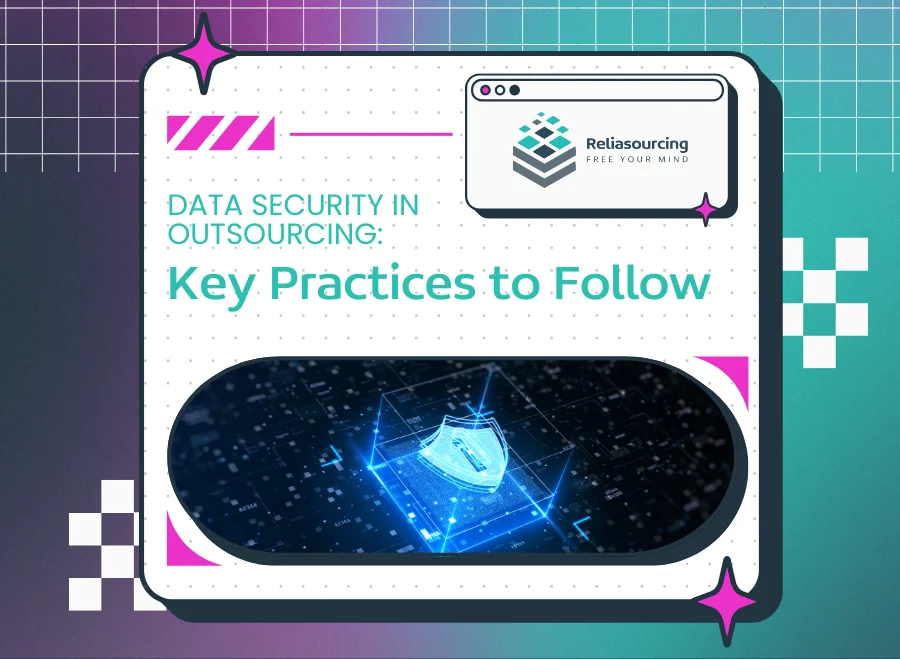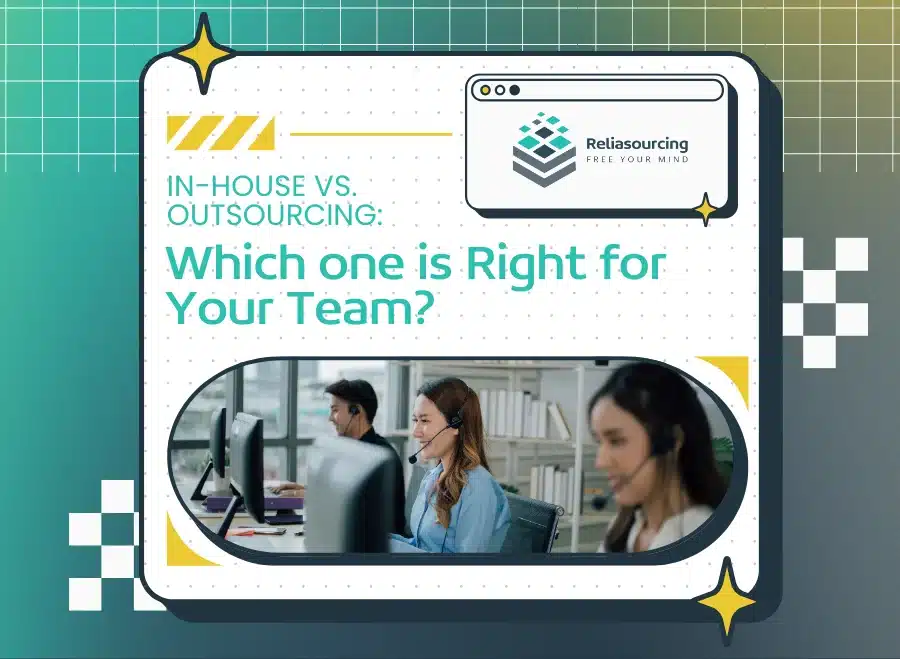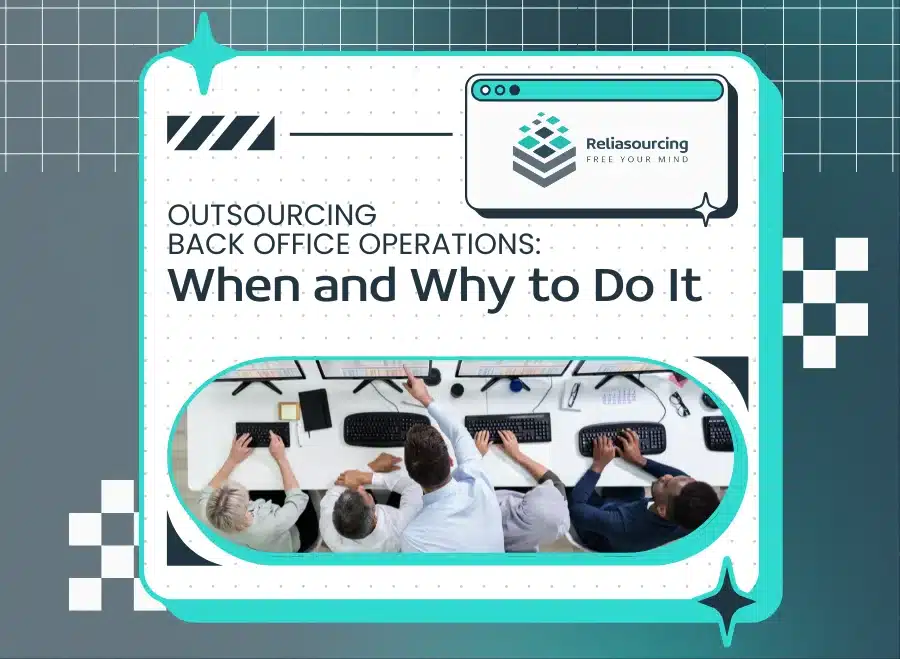How confident are you that outsourcing your sensitive business data is safe? More companies are turning to outsourcing to boost efficiency, cut costs, and access global talent. Now, a critical question arises: how can you protect your data in the hands of third-party providers? As cyber threats become more prominent and regulations tighten, understanding how to ensure data security in outsourcing is essential for businesses.
Why Data Security Is Critical in Outsourcing
Outsourcing unlocks access to global talent and innovation, but it also extends a company’s digital perimeter, exposing it to new cyber threats. Third-party vendors are frequent targets for cybercriminals, with internal lapses and outdated protocols further increasing risk. Regulatory compliance, such as GDPR and HIPAA, adds another layer of complexity, where failures can damage finances and reputation.
Strong data protection in outsourcing is essential for avoiding risks. Businesses can grow with confidence, knowing their most valuable asset—data—is secure. Such protection remains vital throughout every stage of the outsourcing journey. When outsourcing, businesses extend their digital perimeter. This expansion introduces potential vulnerabilities:
- Data Breaches: Cybercriminals often target third-party vendors as entry points.
- Compliance Violations: Failure to meet standards like GDPR or HIPAA can result in hefty fines.
- Third-Party Risks: Even trusted vendors may have weak links in their security chain.
With 20% of data breaches in 2024 linked to third-party vendors, it’s clear that businesses must take proactive steps to safeguard their information. Understanding the risks involved is the first step toward building a secure outsourcing strategy. Let’s explore the most common data security threats you must watch out for.
Common Data Security Risks in Outsourcing
While outsourcing offers undeniable advantages, it also introduces various security challenges that businesses must be prepared to face. Risks often arise from entrusting sensitive data and critical operations to external partners who may operate under different security standards, technologies, and protocols. Even minor lapses can lead to significant vulnerabilities without proper oversight and safeguards.
Insider Threats
Insider threats are a significant risk in outsourcing, as employees can compromise sensitive data through negligence or malicious intent. Businesses expose themselves to internal vulnerabilities without rigorous background checks, continuous monitoring, and strong internal policies.
Weak Encryption Protocols
Encryption is vital for data protection, but if an outsourcing partner uses weak or no encryption, data becomes vulnerable during transmission and storage. Strong encryption methods are essential, but not universally adopted by all vendors.
Poor Access Controls
Data security relies on limiting access to necessary personnel. Many outsourcing firms lack strict role-based access controls (RBAC), increasing the risk of accidental leaks or misuse. Without multi-factor authentication and regular audits, businesses face heightened exposure to risks.
Best Practices for Securing Outsourced Data
A 2024 IBM report found that 20% of data breaches stem from third-party vendors, costing businesses millions. This makes data security not just an IT issue, but a core business priority.
Ensuring data security in outsourcing requires a comprehensive strategy that combines technology, process management, and strong partnerships. Third-party vendors are significant targets for cybercriminals, and internal lapses or outdated protocols heighten the risk. Regulatory compliance, like GDPR and HIPAA, adds complexity, as failures can harm finances and reputation.
Cybersecurity Ventures forecasts that by 2025, cybercrime will cost the world $10.5 trillion annually, up from $3 trillion in 2015. This staggering figure includes losses from data breaches, ransomware, business interruptions, and other attack vectors—many of which exploit third-party systems. These projections highlight the urgency of implementing robust data protection policies in outsourced environments, where vendor mismanagement or security gaps can amplify an organization’s risk profile. Securing outsourced data rather than an isolated IT issue is a mission-critical function tied directly to business continuity and resilience.
Proactively addressing these challenges starts with understanding where risks lie. Let’s walk through the best practices that help organizations proactively counter common data security threats in outsourcing.
Implement End-to-End encryption
Ensure all data (emails, files, database entries) is encrypted in transit and at rest using advanced encryption standards (AES-256 or higher). Verify compliance through technical audits, especially for sensitive information like financial records and personal data.
Enforce Access Control Policies
Adopt the principle of least privilege (PoLP) by implementing strict RBAC with multi-factor authentication (MFA) and session timeouts. Regularly review access logs to detect anomalies.
Conduct Vendor Risk Assessments
Establish a formal, annual risk assessment process for vendors, evaluating security certifications (e.g., ISO 27001, SOC 2), data breach history, and security infrastructure to ensure ongoing safety.
Draft Secure Contracts
Define data security obligations in contracts, including encryption standards, breach notifications, and compliance responsibilities. Service Level Agreements (SLAs) should specify security metrics, and legal teams must collaborate with IT security for enforceability.
Regular Security Audits & Penetration Testing
Conduct regular audits (quarterly or biannually) and penetration testing to validate adherence to security measures and identify vulnerabilities.
Embedding these best practices into outsourcing frameworks and daily workflows transforms data security from a defensive tactic into a forward-looking strategy. This approach safeguards sensitive information and builds lasting, transparent relationships with outsourcing partners, laying the foundation for sustainable growth and mutual trust.
Compliance & Regulations: What Businesses Must Know
Outsourcing involves navigating complex data protection laws and industry standards globally. Each country has regulations, and non-compliance can result in hefty fines, legal issues, and lasting reputational harm. Understanding these laws is essential for a secure outsourcing strategy.
GDPR (General Data Protection Regulation) – This comprehensive EU law governs how businesses collect, store, and process personal data, impacting any company handling EU citizens’ information, regardless of where the company is based.
HIPAA (Health Insurance Portability and Accountability Act) – Essential for businesses dealing with healthcare data in the US, HIPAA mandates strict controls over the privacy and security of patient information.
CCPA (California Consumer Privacy Act) – A leading US data privacy law that grants California residents greater control over their data and applies to many companies across the US and beyond.
ISO 27001 – An internationally recognized standard that outlines best practices for establishing, implementing, and maintaining an information security management system (ISMS).
Compliance helps businesses avoid fines and shows their commitment to data integrity and customer protection. Non-compliance can damage trust and indicate a lack of prioritization for safeguarding sensitive information. For outsourcing companies, adhering to regulations is crucial for building trust, maintaining competitiveness, and achieving long-term success in a data-focused world.
Cost Comparison: In-House vs. Outsourced Data Security Management
When safeguarding sensitive data, businesses must choose between building an in-house security infrastructure or opting for an outsourced solution. Each option has unique financial and operational implications, making it crucial to understand these differences to align security strategies with budget and growth goals. Below are key cost factors to consider.
| Cost Factors | In-House Team | Outsourced Solution |
| Talent Acquisition | $100K–$200K/year (per cybersecurity role) | ~$40K–$80K/year (contract basis) |
| Infrastructure | $250K–$500K+(tools & hardware) | Included/shared infrastructure |
| Compliance Management | $50K+/year (consultants & audits) | Built into vendor agreements |
| 24/7 Monitoring | $300K+/year(full in-house team) | ~$100K/year bundled services |
| Scalability | Limited, adds ~30% more cost/level | Elastic pricing; pay-as-you-grow |
While in-house teams offer complete control over security protocols, they come with steep costs. According to Glassdoor data on cybersecurity salaries, hiring cybersecurity professionals typically ranges from $100K to $187K per year per role.
Adding urgency to these cost pressures, Gartner predicts that by 2027, 17% of total cyberattacks will involve generative AI, increasing the complexity and volume of threats organizations face. In response, worldwide end-user spending on information security is projected to total $212 billion in 2025, a 15.1% increase from 2024’s estimated $183.9 billion. As AI and GenAI adoption rise, security spending is expected to spike by an additional 15% in software categories like application and data protection. Altogether, in-house models can be cost-prohibitive and inflexible, particularly for smaller or scaling businesses.
Outsourcing, on the other hand, delivers access to specialized expertise, bundled infrastructure, and elastic service models at significantly lower costs. According to Alert Logic, base-level Managed Security Service Provider (MSSP) packages start around $40K annually. For SMBs and high-growth organizations, outsourcing security is more than just a financial decision—it’s a strategic lever for agility, resilience, and focus.
Step-by-Step Guide: How to Find and Manage Secure Outsourced Teams
Adopting a structured approach to finding and managing secure outsourced teams is imperative to safeguard sensitive information. Here’s a refined step-by-step guide to help ensure that your data remains protected throughout the outsourcing process.
- Define Your Security Requirements
Clearly outline what data will be shared with your outsourced teams and the necessary level of protection required to mitigate risks effectively. - Research Potential Vendors
Seek out providers that demonstrate expertise in your industry and possess recognized security certifications, such as ISO and SOC 2. This ensures that they adhere to rigorous security standards. - Request Security Documentation
Before making any commitments, thoroughly review their data protection policies, past audit reports, and incident response plans to assess their readiness for handling security incidents. - Negotiate Clear SLAs
Work to establish service level agreements that specify security benchmarks. These agreements should detail expectations regarding response times and reporting during a data breach. - Onboard with Security Training
Facilitate comprehensive training sessions for outsourced teams, focusing on your company’s data handling protocols. This equips them with the knowledge they need to protect sensitive information. - Implement Continuous Oversight
Leverage monitoring tools to maintain ongoing surveillance of outsourced activities. Schedule regular check-ins to address any potential security concerns proactively. - Review & Update Contracts Annually
Security threats and regulations are constantly evolving. Therefore, it is essential to review and adapt contracts yearly to ensure compliance with the latest standards and practices.
Organizations can mitigate outsourcing risks and foster secure collaborations by prioritizing security and clear communication. This proactive approach enhances operational excellence and builds trust with partners. Offshoring, in particular, can unlock access to global talent pools and cost efficiencies while still maintaining robust data protection—if managed with the right safeguards and cultural alignment.
How Reliasourcing Ensures Data Security in Outsourcing
Reliasourcing goes beyond standard security protocols to deliver a comprehensive, client-centric approach to data protection. With a deep understanding of the complexities involved in outsourcing, we’ve built a framework that prioritizes transparency, compliance, and proactive risk management.
- Proactive Security Audits: Regular third-party audits and internal assessments keep our defenses sharp and aligned with evolving cyber threats.
- Advanced Access Management: We implement dynamic role-based access controls, minimizing data exposure by ensuring only authorized personnel interact with sensitive information.
- End-to-End Encryption Practices: All communications and data transfers are safeguarded using the latest encryption technologies, protecting client data both in transit and at rest.
- Specialized Security Teams: Our dedicated cybersecurity professionals monitor, detect, and respond to threats in real-time, ensuring swift action against potential vulnerabilities.
Reliasourcing doesn’t just safeguard data—we empower businesses to outsource confidently, knowing industry-leading practices protect their critical information. We offer end-to-end support for companies seeking offshore solutions, ranging from compliance-ready processes and dedicated account managers to continuous operational coverage, ensuring seamless integration with client workflows.
Our approach ensures that clients reduce operational costs and gain a reliable partner capable of seamlessly integrating seamlessly with their workflows. Explore Reliasourcing to learn more about how we tailor our business solutions and discover why companies trust us as their outsourcing partner.
FAQ: Answering Common Concerns
How can I ensure my outsourced team follows data security best practices?
You can ensure your outsourced team follows data security best practices by selecting vendors with verified security certifications, establishing clear contractual obligations, and maintaining active oversight through audits and continuous monitoring.
What legal protections exist for companies outsourcing sensitive data?
Legal protections for companies outsourcing sensitive data include comprehensive contracts, non-disclosure agreements (NDAs), and compliance with international regulations like GDPR, HIPAA, and CCPA, which collectively safeguard sensitive information.
How do outsourcing providers prevent insider threats?
Outsourcing providers can prevent insider threats by conducting thorough background checks, enforcing strict role-based access controls, continuously monitoring data access, and implementing strong internal security policies.
Summary & Final Thoughts
Data security in outsourcing is a shared responsibility requiring vigilance, strategic partnerships, and adherence to best practices. While risks exist, they can be effectively mitigated with the right approach.
Reliasourcing stands at the forefront of secure outsourcing solutions, helping businesses scale confidently without compromising their data integrity.
Ready to partner with a provider that prioritizes your data security? Contact Reliasourcing today to build a secure and scalable outsourcing strategy tailored to your needs.







